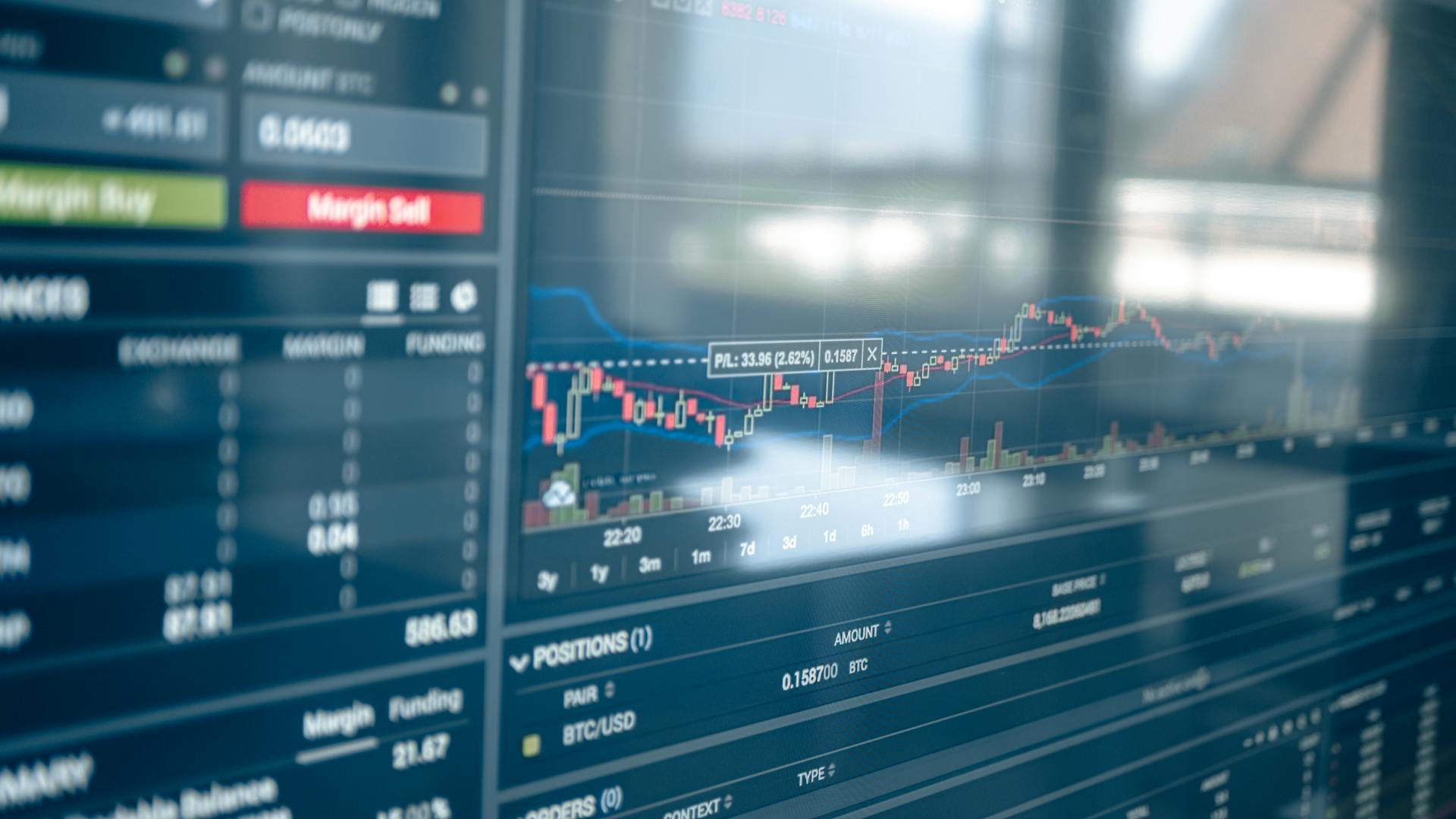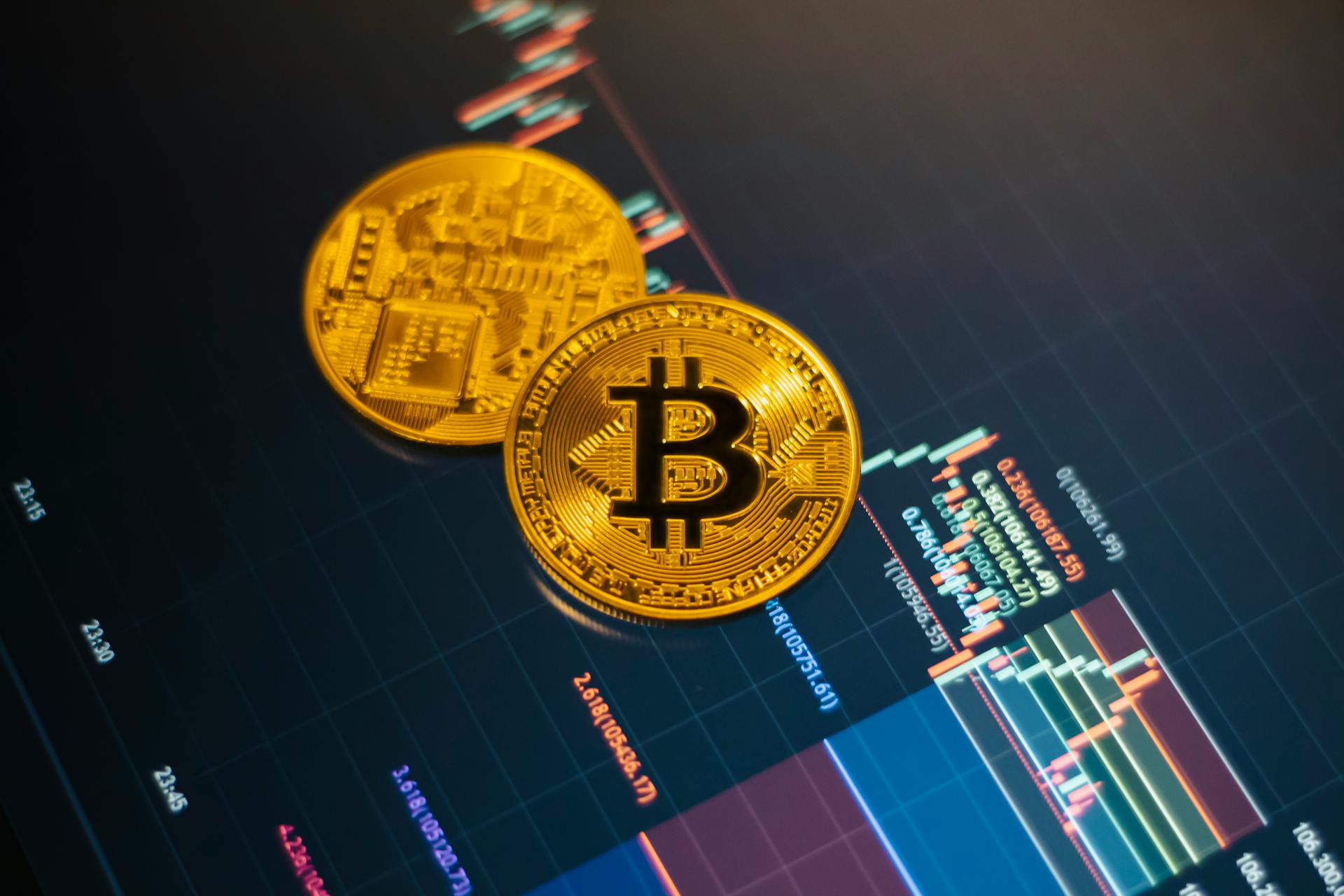
A crypto exchange is a platform where you can buy, sell, or trade cryptocurrencies like Bitcoin, Ethereum, or Litecoin for other digital currencies or traditional currencies like the US dollar.
These platforms act as intermediaries, matching buyers and sellers and facilitating transactions.
Choosing the right exchange can be overwhelming, especially for beginners.
Consider the fees associated with each exchange, which can range from 0.1% to 1% per transaction.
Some exchanges, like Binance, offer lower fees for high-volume traders.
Readers also liked: Crypto Currencies in India
What is a Crypto Exchange?
A crypto exchange is a platform that allows you to buy, sell, and trade cryptocurrencies. This is the most straightforward way to get involved in the world of crypto.
Crypto exchanges are relatively new, with the first one, Bitcoin Market, launching on March 17, 2010.
You'll need to research and choose a crypto exchange that suits your needs, considering factors like deposit and withdrawal limits, fees, payment methods, and regional restrictions.
Some exchanges have mobile-only apps, while others require powerful, specialized computers. Each exchange has varying levels of security and associated fees.
Here are some key factors to consider when selecting a crypto exchange:
- Deposit/withdrawal limits
- Fees
- Payment methods
- Regional restrictions and regulations
- Reputation
- Verification requirements
It's essential to be aware of these factors to ensure you find an exchange that meets your needs and expectations.
How It Works
Cryptocurrencies are supported by a technology called blockchain, which keeps track of who owns what and maintains a tamper-resistant record of transactions.
The use of blockchain addressed a problem faced by previous digital currency efforts: preventing people from making copies of their holdings and spending it twice.
Individual units of cryptocurrencies are referred to as coins or tokens, depending on how they're used, and some can be used to participate in specific software programs like games and financial products.
Key Highlights
Centralized Cryptocurrency Exchanges (CEXs) are the most common way to transact in cryptocurrencies, and they operate using an order book system.

CEXs act as intermediaries between buyers and sellers, making money through commissions and transaction fees.
Popular Crypto Exchanges include Binance, Coinbase Exchange, Kraken, and KuCoin, which allow investors to buy and sell digital assets at the prevailing price or leave orders to be executed at a later time.
Decentralized Cryptocurrency Exchanges (DEXs) allow peer-to-peer transactions directly from your digital wallet without an intermediary.
DEXs rely on smart contracts, which are self-executing pieces of code on a blockchain, to facilitate transactions with less slippage (transaction costs) than CEXs.
Here are some key differences between CEXs and DEXs:
DEXs are meant for sophisticated investors, as they require users to manage their own transactions without the help of an intermediary.
How It Works
Cryptocurrencies are supported by a technology called blockchain, which keeps track of transactions and ownership.
The blockchain technology prevents people from making copies of their holdings and attempting to spend them twice, a problem faced by previous digital currency attempts.
Individual units of cryptocurrencies can be referred to as coins or tokens, depending on how they are used.
Some cryptocurrencies are intended to be units of exchange for goods and services, while others are stores of value.
In the case of some cryptocurrencies, they can be used to participate in specific software programs, such as games and financial products.
Transaction Fees
Transaction fees can be a significant consideration when using centralized exchanges. Unlike peer-to-peer transactions, these exchanges often charge high transaction fees for their services and convenience.
These fees can be especially high when trading in large amounts. Centralized exchanges typically charge a percentage of the transaction value, which can add up quickly.
Centralized exchanges are the norm for many cryptocurrency traders, and while they offer convenience, they often come with a price tag.
A different take: What Crypto Exchange Has the Lowest Fees
Liquidity Struggles
Decentralized exchanges often lack liquidity, making it difficult to find buyers and sellers when trading volumes are low. This is evident in the fact that 99% of crypto transactions are facilitated by centralized exchanges.
Centralized exchanges are accountable for the majority of the trading volume, which can lead to a lack of liquidity on decentralized exchanges.
Security and Risks
Centralized exchanges are operated by companies that are responsible for the holdings of their customers, making them a target for hackers and theft.
Large exchanges usually hold billions of dollars worth of bitcoin, making them a vulnerable target.
Mt.Gox, once the world’s largest cryptocurrency exchange company, reported the theft of 850,000 bitcoins, leading to its collapse.
Hacking Risk
Centralized exchanges are operated by companies that hold billions of dollars worth of bitcoin, making them a target for hackers and theft.
Large exchanges like Mt.Gox, which was once the world’s largest cryptocurrency exchange company, have been victims of such incidents, with Mt.Gox reporting the theft of 850,000 bitcoins, leading to its collapse.
The risk of hacking is a major concern for centralized exchanges, and it's essential to be aware of this risk when using them.
Centralized exchanges often hold users' digital assets as custodians, which can lead to a loss of control over one's own assets in the event of a hacking incident.
Recent examples of centralized exchange failures include the sudden collapse of FTX and Alameda Research.
Preventing Market Manipulation
Decentralized exchanges prevent market manipulation by allowing for peer-to-peer exchange of cryptocurrencies, protecting users from fake trading and wash trading.
This means that users have more control over their transactions and can't be influenced by central authorities or malicious actors.
The nature of decentralized exchanges makes it difficult for individuals to manipulate the market, as trades are conducted directly between users.
As a result, users can trust that the trades they make are legitimate and not artificially inflated or deflated.
Decentralized exchanges provide a more secure and transparent trading environment, which is essential for maintaining investor confidence.
Explore further: Peer-to-peer Crypto Exchange
Reliable
Centralized exchanges offer an extra layer of security and reliability through their developed, centralized platforms, providing higher levels of comfort for transactions and trading.
This is particularly evident in the way they facilitate transactions, which can be a major source of stress for investors.
By using a centralized platform, investors can rest assured that their transactions are secure and reliable.
Centralized exchanges have a proven track record of successfully handling transactions, making them a more reliable option for investors.
Decentralized Exchanges
Decentralized exchanges, or DEXs, are a type of crypto exchange that lacks third-party oversight.
A DEX is open source and depends on peer-to-peer (P2P) trading. This means that users trade directly with each other, without the need for an intermediary.
DEXs often require more technological skill and intimate knowledge of cryptocurrencies to use than centralized exchanges. They can be a good option for experienced traders who want more control over their transactions.
A key benefit of DEXs is that they don't charge fees to the exchange operator, unlike centralized exchanges. However, they may still charge other types of fees.
In terms of functionality, DEXs are similar to traditional crypto exchanges. They facilitate the buying and selling of digital assets based on daily market prices.
Centralized Exchanges
Centralized Exchanges are platforms that allow users to buy, sell, and trade cryptocurrencies with other users. They act as intermediaries, holding users' funds and facilitating transactions.
These platforms are often compared to traditional stock exchanges, where users can trade stocks and bonds. They're also known as "custodial" exchanges, because they hold users' private keys and manage their funds.
Worth a look: How to Trade Ethereum
Centralized Exchanges are popular because they offer a user-friendly interface and a wide range of trading options. They're also often the first point of entry for new cryptocurrency investors.
However, Centralized Exchanges have been criticized for their lack of transparency and security risks. They're also subject to regulations and laws that can impact their operations.
In contrast to Decentralized Exchanges, Centralized Exchanges are governed by a single entity, which can lead to a higher level of control and oversight.
Legislation
Legislation plays a crucial role in shaping the crypto exchange landscape.
Several cryptocurrency exchanges operating in the European Union obtained licenses under the EU Payment Services Directive and the EU Electronic Money Directive by 2016.
The U.S. Securities and Exchange Commission requires platforms that offer trading of digital assets that are securities and operate as an "exchange" to register with the SEC as a national securities exchange or be exempt from registration.
The Commodity Futures Trading Commission permits the trading of cryptocurrency derivatives publicly.
Japan mandates the need for a special license from the Financial Services Authority to operate a cryptocurrency exchange.
China and Korea remain hostile towards cryptocurrency exchanges, with China banning bitcoin miners and freezing bank accounts.
Australia requires its citizens to disclose their digital assets for capital gains tax.
Top Exchanges
A crypto exchange is a platform where you can buy, sell, and trade cryptocurrencies. There are two main types: centralized and decentralized exchanges.
Centralized exchanges are like traditional stock exchanges, where a third party manages and facilitates trades. The top centralized exchanges, according to traffic, liquidity, and trading volumes, are Binance, Coinbase Exchange, Kraken, KuCoin, Binance.US, Bitfinex, Gemini, Coincheck, Bitstamp, and Bybit.
Decentralized exchanges, on the other hand, allow users to trade cryptocurrencies directly with each other without the need for a third party. The top decentralized exchanges are Uniswap (v3), dYdX, Curve Finance, Kine Protocol, PancakeSwap (v2), DODO (Ethereum), Sun.io, ApolloX DEX, Uniswap (V2), and Perpetual Protocol.
If you're new to crypto, it's worth noting that Binance is one of the largest centralized exchanges in the world, with a huge market share and a wide range of trading options.
For another approach, see: How to Trade Crypto Coins
Top 10 by Volume (as of November 2022)
Binance holds the top spot as of November 2022, with a trading volume of $2.3 trillion.
Kraken takes the second spot with a trading volume of $1.2 trillion.
Huobi ranks third with a trading volume of $1.1 trillion.
FTX ranks fourth with a trading volume of $943 billion.
Coinbase ranks fifth with a trading volume of $742 billion.
OKX ranks sixth with a trading volume of $644 billion.
Bybit ranks seventh with a trading volume of $594 billion.
Bittrex ranks eighth with a trading volume of $554 billion.
KuCoin ranks ninth with a trading volume of $534 billion.
Upbit ranks tenth with a trading volume of $494 billion.
For your interest: Crypto Coin Volume
Top Exchanges
If you're new to cryptocurrency trading, you might be wondering where to start. The top centralized exchanges are a good place to begin, with Binance leading the pack in terms of traffic, liquidity, and trading volumes.
Binance is a powerhouse in the cryptocurrency world, with a user-friendly interface and a wide range of trading options.
For your interest: Binance Crypto Exchange
Some other notable centralized exchanges include Coinbase Exchange, Kraken, and Bitfinex, which are also popular among traders.
Here are the top centralized exchanges in a concise list:
- Binance
- Coinbase Exchange
- Kraken
- KuCoin
- Binance.US
- Bitfinex
- Gemini
- Coincheck
- Bitstamp
- Bybit
On the other hand, decentralized exchanges are a great option for those who value their autonomy and security. Uniswap (v3) is currently the top decentralized exchange, followed closely by dYdX.
Decentralized exchanges are a great way to trade cryptocurrency without relying on a third-party intermediary.
If you're interested in decentralized trading, here are the top exchanges to consider:
- Uniswap (v3)
- dYdX
- Curve Finance
- Kine Protocol
- PancakeSwap (v2)
- DODO (Ethereum)
- Sun.io
- ApolloX DEX
- Uniswap (V2)
- Perpetual Protocol
Frequently Asked Questions
Can crypto exchanges take your money?
Yes, some crypto exchanges can take your money by lending it to others and charging interest, similar to a bank. However, their lending practices and risk management may be less transparent than traditional banks.
Sources
- https://www.gemini.com/cryptopedia/what-is-a-crypto-exchange
- https://www.nerdwallet.com/article/investing/cryptocurrency
- https://corporatefinanceinstitute.com/resources/cryptocurrency/cryptocurrency-exchanges/
- https://en.wikipedia.org/wiki/Cryptocurrency_exchange
- https://www.investopedia.com/crypto-exchanges-5272125
Featured Images: pexels.com


